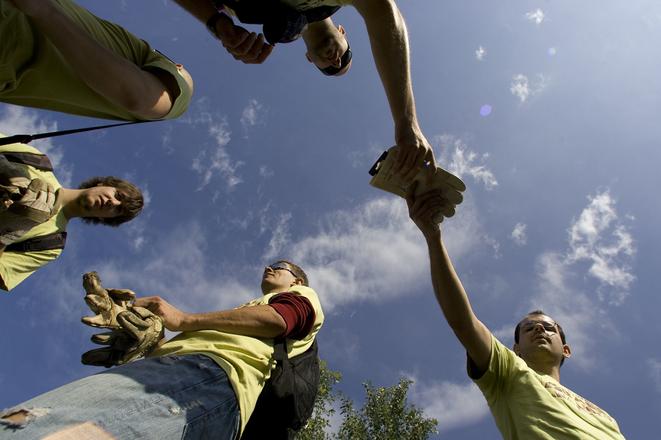Even at the turn of the millennium central European countries considered corporate social responsibility (CSR) more of a voluntary activity in which companies contributed their funds to charities and thus increased their credibility.
In recent years, however, the situation has changed and companies have gathered and used more ideas of improving sustainability and living conditions across society. Indeed, the ambitions of many of today’s entrepreneurs include sustainable behaviour in all aspects of their business, including the supply chain. Companies more often see sustainability as continuous work on themselves and regularly evaluate their impact on their surroundings, according to Markéta Šetinová, coordinator of the Czech branch of the worldwide CSR initiative Global Compact Network.
“They also feel much more pressure from their customers, investors and legislation,” Šetinová told The Slovak Spectator.
Spreading an idea
The idea of CSR today covers overall business behaviour that leads to sustainable development and improvement in the quality of life in society. Even in Slovakia it is no longer simply about the redistribution of profits, but whether companies make their profits in a responsible manner, according to the executive director of the Business Leaders Forum (BLF) Michal Kišša.
In contrast, the startup SmartHead, which focuses on the promotion of CSR, sees that CSR activities still evoke in Slovak companies something complicated and expensive. If companies prosper, they can easily share their success through enhancement of the surrounding environment or support of the areas that need it, said Ján Dudáš, co-founder and COO of SmartHead.
“Cleaning up a forest can precede team-buildings in nature,” Dudáš told The Slovak Spectator.
Slovak trends
While there is no specific CSR topic to which companies in Slovakia incline, the most frequent activities are fair-mindedness to employees, health and safety at work, and environmental protection. In addition, Kišša sees many companies doing business with products for disadvantaged people, eco-products and social innovations.
“Often it is not only collaboration with suppliers, but also transparency and fair behaviour towards customers,” said Kišša, adding that because the government is failing in many areas, philanthropy is another important part of CSR.
The general Slovak public thus also improves its awareness on the issue. Currently, BLF keeps track of the 18 percent of the population that does not know anything about CSR. By contrast, 33 percent even know how to identify responsible businesses, Kišša said.
Responsible firms remain responsible
Among the significant socially responsible companies, experts include mainly IT companies Eset, Pixel Federation and the bank Citibank engaged in the education sector, the retail chain Lidl that planted 500,000 trees in the High Tatras, the energy producer Slovenské Elektrárne contributing to mitigating climate change and the telecom operator Slovak Telekom with its activities for a better life for the hearing impaired.

Another long-term Slovak CSR contributor is the compressor producer Embraco Slovakia. While employees of the company from Spišská Nová Ves (Košice Region) became volunteers about 10 years ago, it received the main prize Via Bona for a responsible large corporation in 2013.
Today the company focuses mainly on helping children and young people in the region in fields such as health, sports, education and environment, said Emília Gondeková of Embraco Slovakia.
Together with the Pontis Foundation it manages an endowment fund, while with the Rozbehni sa! (Run It!) initiative they launched the programme iNOVEum, searching for innovative students in eastern Slovakia.
Different global visions
While developed countries usually apply CSR ideas on a regular basis, current global trends mainly include Sustainable Development Goals (SDGs). At the 2015 OSN summit in New York, 193 member states of OSN officially adopted these activities aimed at reducing poverty and fighting climate change.
“The preparation of adoption included the private sector as an important engine in the implementation of goals for the first time,” Šetinová said. SDGs would take Slovak companies too; at least those with a head of a transnational group which apply strategies for sustainability, she added.
Dudáš pointed to the example of Denmark, which puts the needs of society over individuals. The Danish public sector supports the initiative Stop Spild Af Mad (Stop Wasting Food) which has reduced food waste by 25 percent and has saved 4.4 billion Danish Krones over the last 5 years.
“All Danes have a deeply rooted idea about helping their environment, hence CSR is usually part of the strategic management of companies already from their formation,” Dudáš said.
Denmark incorporates CSR into the curriculum at universities, therefore, students take it as a matter of course later in their practical life, Dudáš added.
Companies and customers
The development of sustainability and CSR depends on the faith of companies in these ideas, according to experts. Kišša pointed out that CSR should be a response to the specific needs of a company’s stakeholders.
“If the needs and requirements of these groups change, the activities of companies change too,” Kišša said.
In decision-making, companies follow their financial situation, people who decide on company involvement and customer demand. Proper integration of CSR into the long-term strategy may lead to reduction in operating costs, better reputation and gaining or retaining customers, according to Dudáš.
In addition, Šetinová sees a jump in demand of customers for responsible entrepreneurship. A great example is the case of palm oil, according to which customer interest led to many companies rethinking its use, she said.
How to expand CSR
Though Slovakia cannot catch up to the perception of CSR in western Europe overnight, the public will be more sensitive if media increasingly take on the issue, said Kišša. People will demand products and services from responsible companies and will want to work work in such companies.
“Responsibility in business will become a market requirement, because without such an approach companies will not be able to exist in the long term,” Kišša said.
Dudáš suggests thinking of CSR as a role for all levels of society to promote and adopt initiatives that lead to positive results; take the idea as a big business advantage and teach the next generation to be responsible.



 Volunteers from corporate sector help to improve the environment within the initiative Naše Mesto (Our City). (source: Sme)
Volunteers from corporate sector help to improve the environment within the initiative Naše Mesto (Our City). (source: Sme)